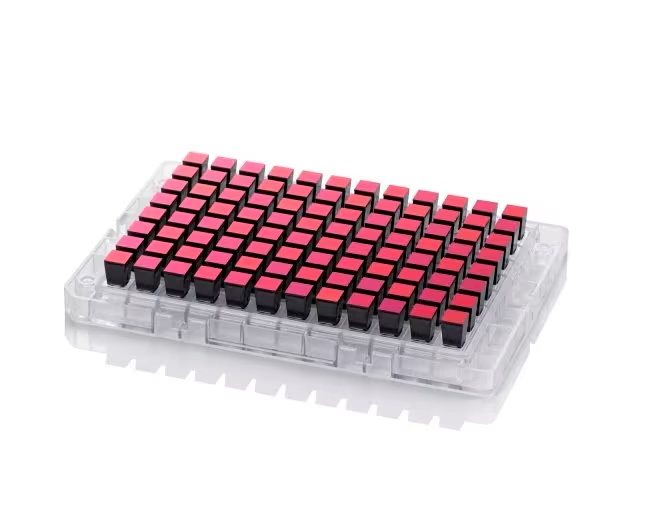
The Axiom™ PangenomiX Plus Array brings the most ethnically diverse genomic coverage in a high throughput format array to researchers’ fingertips. This human genotyping research array was mindfully designed for whole genome imputation across global populations to enable scientists to create diverse genomic datasets that have traditionally been built on Caucasian cohorts. It is an essential research tool in human genomics, including applications such as genome wide association studies (GWAS), population health initiatives, polygenic risk scores, pharmacogenomics, and drug discovery.
The Axiom™ PangenomiX Plus genotyping array offers ethnically diverse genomic coverage in a high throughput format array. This human genotyping research array was designed for whole genome imputation across global populations, enabling scientists to create diverse genomic datasets that have traditionally been built on Caucasian cohorts. It is a powerful research tool in human genomics, including applications such as genome wide association studies (GWAS), population health initiatives, polygenic risk scores, pharmacogenomics, and drug discovery.
The Axiom PangenomiX Plus Array can be used to analyze the whole genome, from as little as 100 ng genomic DNA, and enable target SNP identification, copy number variant (CNV) analysis, human leukocyte antigen (HLA) and blood typing in a cost-effective assay with plug and play data analysis.
More than 850,000 markers were selected for high genomic coverage from the 1000 Genomes Project Phase III, yielding coverage for European, African, admixed American, East Asian, and South Asian populations. This means variants prevalent in different populations are represented, leading to more inclusive research outcomes.
In addition to markers selected specifically to maximize imputation power across ethnicities, markers were chosen from broadly referenced public databases, including ACMG 73, ClinVar, NHGRI-GWAS catalog, CPIC, PharmGKB, and PharmaADME, and can be directly genotyped for each sample.
The Axiom PangenomiX Plus Array, used in conjunction with the Axiom 2.0 Plus Assay or Axiom Propel Plus Assay, unlocks over 100 additional markers associated with important haplotypes in genes including CYP2D6. The Plus assay opens up the ability to genotype these important pharmacogenomic markers that are in highly homologous regions of the genome. Based on gene-specific amplification, the Axiom 2.0 Plus Assay overcomes limitations observed in other hybridization-based microarray technologies, making it the array of choice for pharmacogenomics research.
Axiom PangenomiX Plus Array also offers Copy Number Variant (CNV) analysis for fixed genomic regions and de novo copy number discovery to detect copy number changes across the whole genome.
Content Coverage:
• Genome-wide association study (GWAS) imputation module with ∼850,000 markers across all ancestral populations
• Evidence-based markers for relevant variants including ClinVar variants for comprehensive coverage of ACMG73 genes
• Pharmacogenomics variants cited in Clinical Pharmacogenomics Implementation Consortium (CPIC®) guidelines and Pharmacogenomics Knowledge Base (PharmGKB®)
• >2,000 markers in Very Important Pharmacogenes as identified by PharmGKB®
• >300 markers associated with PharmGKB® level 1A-2B annotations
• >550 reportable alleles mentioned in Clinical Pharmacogenetics Implementation Consortium (CPIC®) guidelines
• Targeted amplification to access content in the following genes: CYP1A2, CYP2D6, CYP2B6, CYP2A6, CYP2C19, and those in in highly homologous regions such as CYP2C9, GSTM1, SULT1A1
• Disease-related variants (Alzheimer's, cancer, cardiovascular disease, cardiometabolic disease, diabetes, neurological disorders)
• Blood phenotyping variants for blood typing of common and rare blood groups, bleeding disorders, and blood conditions such as sickle cell anemia
• Human Leukocyte Antigen (HLA) type of 11 major MHC (major histocompatibility complex) Class I and Class II loci
• SARS-CoV-2 immune-related markers (human leukocyte antigens, killer immunoglobulin-like receptors, autoimmune markers, and inflammatory markers)
• Functional variants (loss of function variants, expression quantitative trait loci, nonsynonymous variants, lung phenotypes)
• Ancestry, wellness, and trait-related variants
The Pharmacogenomics Translation Reports include:
• >110 genes
• >75 genes reporting haplotypes
• >1000 reportable haplotypes
• >30 genes with phenotype predictions (e.g. intermediate metabolizer, etc)
Samples can be processed on the 96-format Axiom PangenomiX Plus Array using the Axiom 2.0 Plus manual workflow and the Axiom 2.0 Propel Plus Fast Wash Workflow, to support low to high throughput users. Final array processing is done on the GeneTitan MC Fast Scan Instrument. The Axiom PangenomiX Plus Array is sold as a kit and includes the array, Axiom 2.0 Plus reagents and GeneTitan MC Fast Scan consumables.
The Axiom PangenomiX Plus genotype analysis is supported by Axiom Analysis Suite Software. Axiom HLA Analysis Software can also be used for HLA typing.
For those looking for deeper scientific insights or to include specific SNPs relevant to their disease research area or population-specific variants of interest, Axiom myDesign Custom Array Services are available for the creation of a custom array.
For researchers interested in getting data quickly in absence of your own dedicated wet-lab, contact our global Microarray Research Services Laboratory to genotype your samples on the Axiom PangenomiX Plus Array and receive results ready for immediate downstream analysis.
CPIC® is a registered service mark of the US Department of Health & Human Services (HHS).
PharmGKB® is a registered trademark of HHS.
| Code | Description |
|---|---|
| 952531 | Catalog Number: 952531 Unit Size: 8 x 96 plates kit Species: Human Format: 96-array Plate Number of Arrays: 8 x 96 arrays |
| 952521 | Catalog Number: 952521 Unit Size: 1 x 96 plate kit Species: Human Format: 96-array Plate Number of Arrays: 96 arrays |
| 952530 | Catalog Number: 952530 Unit Size: 4 x 96 plates kit Species: Human Format: 96-array Plate Number of Arrays: 4 x 96 arrays |

